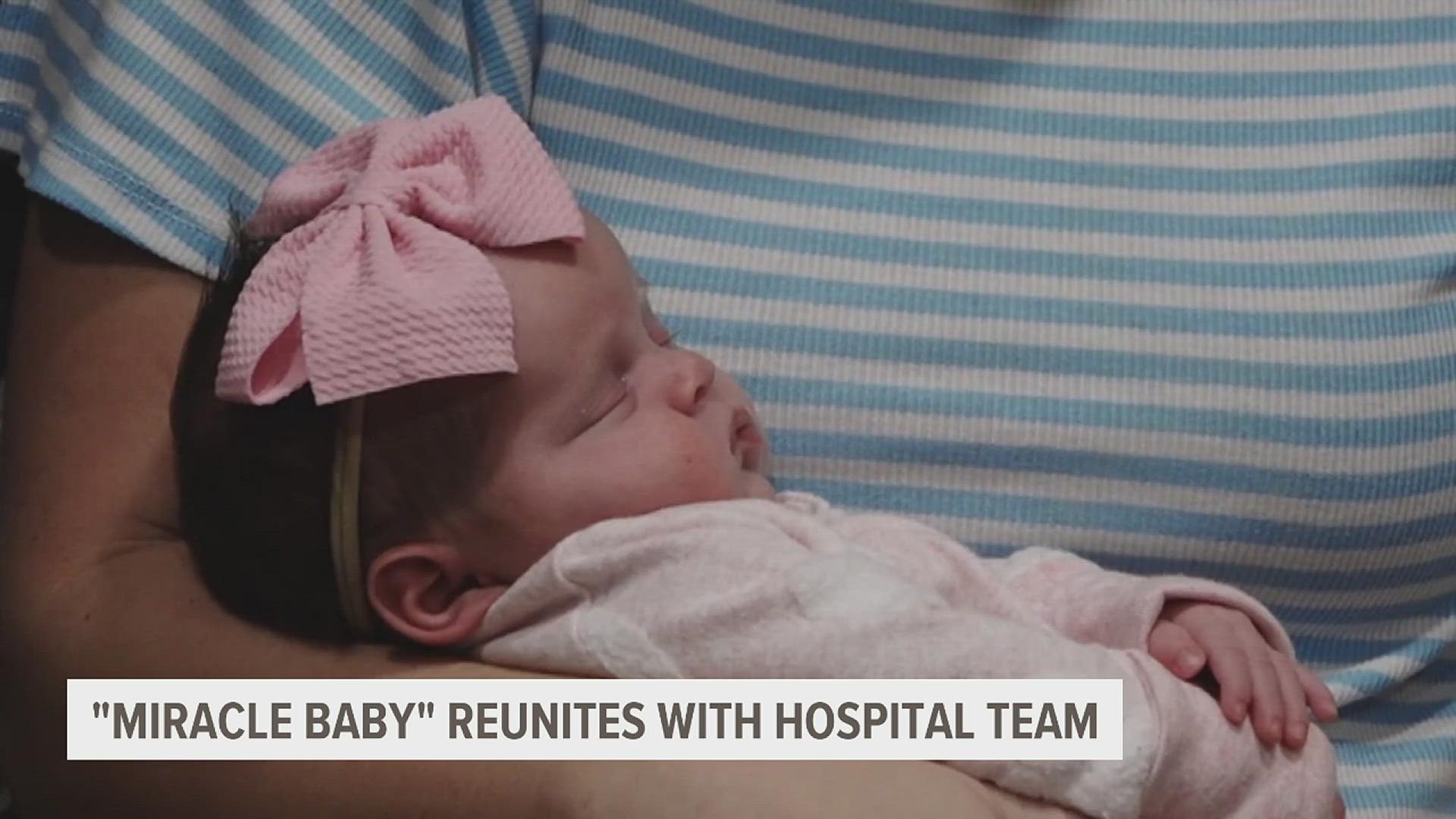DUBUQUE, Iowa — Gwendolyn Yeo opened her eyes, and the staff standing around her Wednesday morning at UnityPoint Health-Finley Hospital’s Family Birthing Suites in Dubuque cooed and smiled.
Her mother, Traci Yeo, looked down at the nearly 3-week-old infant in her arms, dressed in a pink onesie and matching bow.
“These are all very important people, Gwen,” she told her daughter. “They’re why you’re still here.”
The room was full of nurses, doctors, nurse practitioners and more from multiple Finley departments, all of whom had cared for Gwendolyn during her first minutes of life earlier this month, when she was without a heartbeat for 18 minutes until they were able to revive her.
The Dubuque Telegraph Herald reports that after also receiving care in Iowa City, Gwendolyn returned home last week and is not expected to experience any lasting effects, leading her parents and hospital staff to refer to her as a “miracle baby.”
“It’s amazing to see Gwen here, such a healthy little girl,” said Dr. Cara Lepellere, an obstetrician-gynecologist with Dubuque Obstetrics and Gynecology. “I’ve been worried about them since they left the hospital, so it’s very cool to see them back here now.”
Traci, of Dubuque, had a “completely normal” pregnancy until the morning of Jan. 12 — just one week before her due date — when she awoke with severe pain in her lower abdomen. She wasn’t overly concerned at first, but her sister-in-law convinced her to go to the hospital.
When Traci arrived, Lepellere recognized the signs of a placental abruption. The condition occurs when the placenta detaches from the inner wall of the uterus before delivery, which can deprive a baby of oxygen and nutrients.
“Most (placental abruptions) are mild, but there are definitely severe ones that can cause major emergencies,” Lepellere said.
Traci was told to prepare for an emergency cesarean section. She called her husband, William Yeo, who had just gotten home from working third shift at Dubuque Police Department, and he made his way to the hospital.
“What they told me when I got here was, ‘When she’s having a contraction, we can’t find a heartbeat. … That’s causing red flags, so we’re going in (to deliver the baby) now,’” William said.
When Gwendolyn was delivered, she was not breathing and had no heartbeat.
“The only thing I heard was that she was not crying, and that was obviously a bad thing,” Traci said. “Then, we heard, ‘Code pink,’ and a million people were coming into the room.”
Jenni Scott, nurse manager of Family Birthing Suites, said “code pink” denotes a child or infant in cardiac arrest who requires resuscitation. Staff immediately began chest compressions on Gwendolyn, who was officially “coded” for 18 minutes.
Gwendolyn was able to be resuscitated, and staff prepared to transfer her to University of Iowa Hospitals and Clinics in Iowa City. Fog prevented them from transporting her via helicopter, but staff from UnityPoint Health-St. Luke’s Hospital in Cedar Rapids traveled to Dubuque to pick up Gwendolyn and take her to Iowa City.
“I remember thinking, ‘I’m not sure if she’s ever going to see her baby after this,’” Scott said.
Traci remained at the hospital in Dubuque for three days before she could travel to see Gwendolyn. While Traci recovered, William stayed with their daughter in Iowa City, where he said the confidence exhibited by Gwendolyn’s care team convinced him they were in good hands.
“When (the doctor) was confident and knew what he needed to do, it was really reassuring for me,” he said.
Traci said the doctors’ biggest concern for Gwendolyn was the possibility of brain injury from lack of oxygen or blood flow at the time of birth.
For three days, doctors used a cooling blanket to intentionally lower Gwendolyn’s body temperature to prevent any more brain damage. Slowly, she was warmed to natural body temperatures, and after several days, her brain scans came back almost completely clear of any spots of concern.
Although Gwendolyn will be closely monitored for her first few years of life, her care team told her parents she “has no significant issues neurologically or bodily” and is unlikely to have any negative lasting effects, Traci said.
“If you would’ve told me when you left Finley that night that she would be at home in your house in two weeks, and perfect, I would’ve said, ‘Oh, I pray to God that’s true,’” said Leigh Stoewer, a registered nurse and member of the hospital’s lactation team who helped resuscitate Gwendolyn.
Gwendolyn was in the hospital for a total of 12 days, returning home Jan. 24 — on her older brother Zachary’s 2nd birthday.
“I was so nervous that she wasn’t going to be able to grow up to be like her brother, so the fact that she’s going to run and jump and talk … we owe you guys so much,” Traci said to the Finley staff, later adding, “A lot of good things happened down in Iowa City, but none of those good things could have happened had she not gotten the care that she got here at Finley before she left.”
Gwendolyn slept peacefully Wednesday as she was passed from person to person, every staff member wanting a turn to hold the newborn.
“She looks perfect,” said nurse practitioner Rylea Anderson.
Traci smiled.
“She is.”
Watch more news, weather and sports on News 8's YouTube channel

